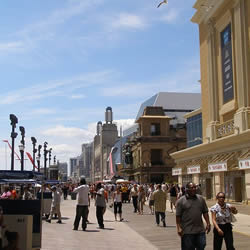Yesterday’s signing of New Jersey’s Internet gambling bill by Republican Governor Chris Christie is huge news, due in no small part to the positive effect it is expected to have on the Atlantic City casino industry, which has been struggling with both a decline in revenue and tourism in recent years.
For six consecutive years, Atlantic City has posted a revenue decrease. In 2012, New Jersey’s casino industry reported an eight percent dip in revenue, with the amount taken in last year down to $3 billion. By contrast, the nation’s other gambling hub, Nevada, has been seeing an increase in both revenue and tourism, with 2012 revenue there up by one and a half percent to $10.86 billion. These figures are according to data collected by Bloomberg.
Folks in New Jersey and across the nation are cheering Governor Christie for moving forward with online betting, with online poker site PokerStars presumably being among Christie’s newest and most ardent fans. Christie’s actions will most likely mean a valiant entry into the New Jersey gambling market for the company.
Now that the online gambling bill has been signed into law, PokerStars should be able to move forward with the purchase of The Atlantic Club Casino Hotel, an Atlantic City resort property that Steve Wynn developed back in the early 1980’s that has fallen into disrepair in the last several years and has more recently been re-branded as a downmarket “locals only” casino.
The parent company of PokerStars, the Rational Group, made a bid to acquire The Atlantic Club late last year, promising to renovate and improve the dilapidated property. Sources close to the negotiations have said that the figure offered is less than $50 million. The completion of the deal relied upon the enactment of the Internet gambling law.
State Senator Raymond J. Lesniak, who has served in New Jersey’s state senate since 1983 and was one of the original sponsors of the bill, suggested that the introduction of Internet-based wagering should be able to save at least two of Atlantic City’s imperiled casinos and may be able to preserve some 4,000 jobs that are in danger of being lost in the city.
A customer playing a slot machine at Harrah’s Resort in Atlantic City last week, Dimakis Kalogerakos, echoed Lesniak’s sentiments, remarking, “Internet gaming is a great thing. It will boost revenue . . . but it will not save Atlantic City from its downturn. It will help. It’s another avenue, just like sports betting will be a good option.”
Another backer of the bill, State Assemblyman John Burzichelli, praised the new law for offering a new market for Atlantic City casinos, saying, “This is the ultimate form of convenience gaming. Atlantic City will pick up some of what is being done illegally now. . . . The resort will be able to renew some relationships [with customers] that have drifted away.”
Players will be able to log onto the online betting websites as long as they are physically present within the borders of New Jersey. The sites will be accessible by computer, as well as by mobile devices like iPhones and iPads, with the state’s constitution requiring that the businesses be based out of Atlantic City.

